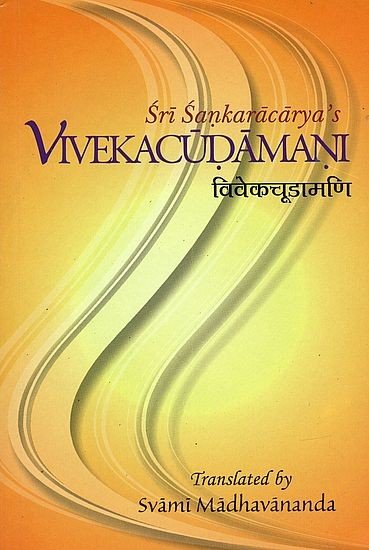Vivekachudamani
by Shankara | 1921 | 49,785 words | ISBN-13: 9788175051065
The Vivekachudamani is a collection of poetical couplets authored by Shankara around the eighth century. The philosophical school this compilation attempts to expose is called ‘Advaita Vedanta’, or non-dualism, one of the classical orthodox philosophies of Hinduism. The book teaches Viveka: discrimination between the real and the unreal. Shankara d...
Verse 98-99
स्वप्नो भवत्यस्य विभक्त्यवस्था
स्वमात्रशेषेण विभाति यत्र ।
स्वप्ने तु बुद्धिः स्वयमेव जाग्रत्
कालीननानाविधवासनाभिः ॥ ९८ ॥कर्त्रादिभावं प्रतिपद्य राजते
यत्र स्वयं भाति ह्ययं परात्मा ।
धीमात्रकोपाधिरशेषसाक्षी
न लिप्यते तत्कृतकर्मलेशैः
यस्मादसङ्गस्तत एव कर्मभिः
न लिप्यते किंचिदुपाधिना कृतैः ॥ ९९ ॥svapno bhavatyasya vibhaktyavasthā
svamātraśeṣeṇa vibhāti yatra |
svapne tu buddhiḥ svayameva jāgrat
kālīnanānāvidhavāsanābhiḥ || 98 ||kartrādibhāvaṃ pratipadya rājate
yatra svayaṃ bhāti hyayaṃ parātmā |
dhīmātrakopādhiraśeṣasākṣī
na lipyate tatkṛtakarmaleśaiḥ
yasmādasaṅgastata eva karmabhiḥ
na lipyate kiṃcidupādhinā kṛtaiḥ || 99 ||98-99. Dream is a state of the soul distinct from the waking state, where it shines by itself. In dreams Buddhi, by itself, takes on the role of the agent and the like, owing to various desires of the waking state, while the supreme Ātman shines in Its own glory – with Buddhi as Its only superimposition, the witness of everything, and is not touched by the least work that Buddhi does. As It is wholly unattached, It is not touched by any work that Its superimpositions may perform.
Notes:
[Buddhi—here stands for the Antahkarana—the “inner organ” or mind.
By itself—independently of the objective world.
Takes on the role &c.—The Atman is the one intelligent principle, and whatever Buddhi does it does borrowing the light of the Atman.]
